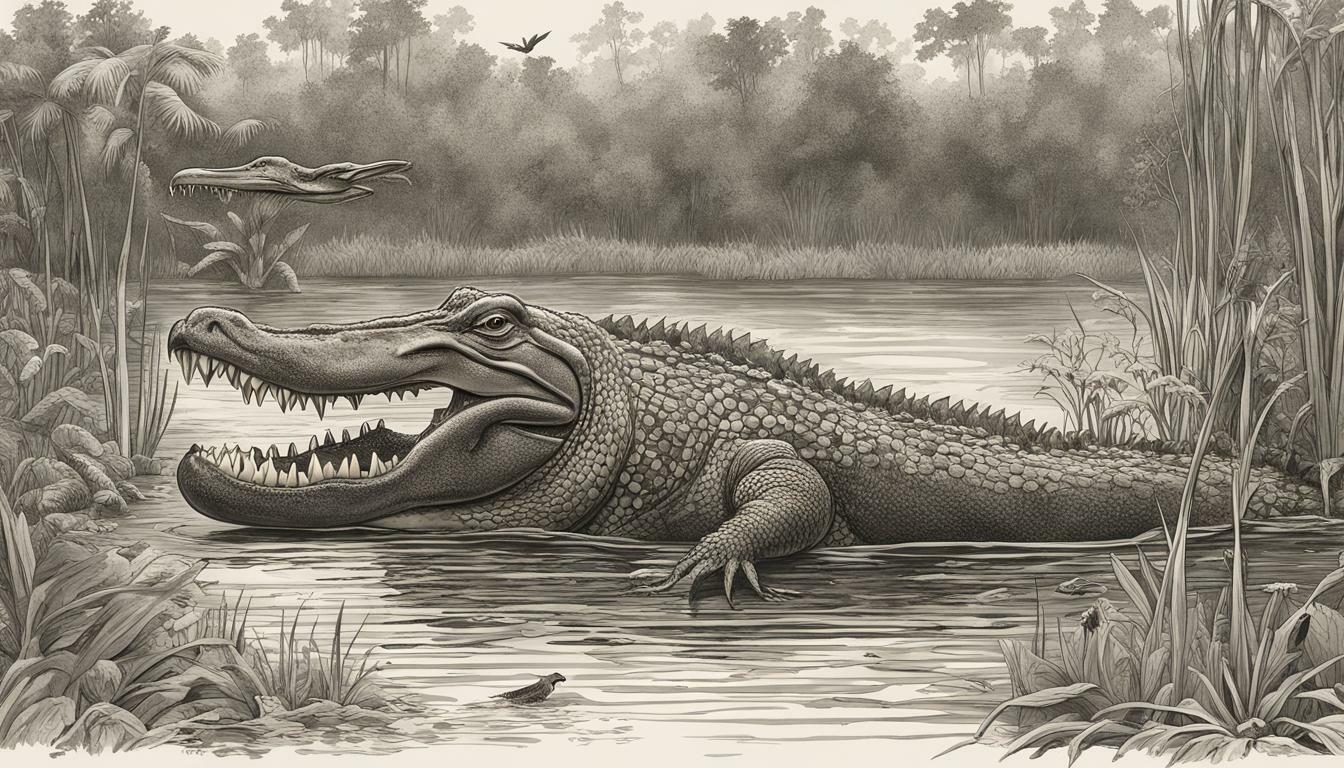If you’ve ever wondered whether alligators eat ducks, the answer is yes! Alligators are known for their formidable hunting skills and are capable predators that can take down a variety of prey, including ducks.
Understanding the feeding habits and predatory behavior of alligators is essential to comprehending their diet. By exploring the dynamics of the alligator-duck relationship, we can gain insight into the role of ducks in an alligator’s diet and the larger ecological balance of American waterways.
Key Takeaways:
- Alligators are capable predators that can eat a variety of prey, including ducks.
- Understanding the feeding habits and predatory behavior of alligators is essential to comprehending their diet.
- Exploring the alligator-duck relationship can provide insight into the role of ducks in an alligator’s diet and the larger ecological balance of American waterways.
Understanding Alligators’ Feeding Behavior and Diet
When it comes to the diet of alligators, they are known to be apex predators. Their feeding habits involve a combination of both opportunistic and predatory behaviors. Like most predators, alligators typically feed on live prey, but they are also known to scavenge on carrion.
Alligators are capable of consuming a wide variety of prey, including fish, turtles, birds, mammals, and even other alligators. Their feeding habits vary depending on the availability and size of prey. For example, when food is scarce, they may resort to feeding on smaller prey such as insects and crustaceans. When larger prey such as deer or cattle are available, they may consume them in one sitting or store them underwater for later consumption.
As for their hunting behavior, alligators are known to be stealthy and patient. They typically hunt in the water, using their powerful tails to propel themselves forward. When hunting, they wait motionless for their prey to come within range and then ambush them with a quick and powerful strike. Their hunting behavior is aided by a unique anatomy that allows them to submerge and remain underwater for extended periods, making them highly efficient predators.
In terms of their diet, ducks are also on the menu for alligators. Ducks can become easy prey for alligators due to their habitat preferences. They typically inhabit shallow water areas that alligators also frequent, making them vulnerable to alligator predation.
Overall, alligators are opportunistic predators that can consume a wide range of prey. Their feeding behavior is highly adapted to their environment and allows them to maintain their position as apex predators in their ecosystems.
Alligators and Ducks: Interaction in the Wild
One of the most fascinating aspects of the natural world is the interaction between different species. When it comes to alligators and ducks, their relationship is a complex one that has intrigued researchers for years. Ducks are a common prey for alligators, but why is this the case?
Alligators are known for their predatory behavior, and as opportunistic feeders, they will consume almost anything they can catch and swallow, including ducks. Ducks, being small and relatively defenseless, are a primary target for alligators.
This interaction is not always one-sided, however. Ducks have developed ways to avoid being caught by alligators. For example, they are excellent swimmers and can escape by diving underwater, where alligators have a harder time catching them. Additionally, ducks often gather in large groups, making it difficult for alligators to target a single bird.
Despite these adaptations, alligators are still a significant threat to ducks in their natural habitats. The interaction between these two species is a delicate balance that affects the entire ecosystem of American waterways.
The Alligator’s Hunting Behavior
When it comes to hunting, alligators are apex predators. Alligators use a variety of techniques to catch their prey, which may include ducks.
One technique alligators use is called ambush predation. They will wait patiently for their prey to approach, remaining perfectly still until the time is right to strike. Alligators may also use lurk-and-pounce tactics, in which they will stalk their prey and then lunge forward to catch it.
Alligators are also capable of pursuing their prey through water and on land. They can swim up to speeds of 20 miles per hour and can run on land at speeds of up to 10 miles per hour for short distances.
Alligators have special adaptations that allow them to capture and consume their prey. Their eyes and nostrils are located on the top of their head, allowing them to remain hidden while scoping out their prey. Alligators have powerful jaws, sharp teeth, and strong digestive systems that allow them to consume even large prey like ducks.
Can Alligators Eat Ducks? Examining the Prey-Prey Relationship
Now that we have a solid understanding of the feeding habits and predatory behavior of alligators, let’s explore the question at hand: can alligators eat ducks?
The answer is yes, alligators can eat ducks. In fact, ducks are a common prey item for alligators, particularly during the nesting season when they are more vulnerable.
Alligators have several physical adaptations that enable them to capture and consume ducks. Their powerful jaws can exert tremendous pressure, making it easy for them to crush the bones of their prey. Additionally, their sharp teeth are useful for tearing apart their prey.
But it’s not just physical characteristics that make alligators successful at hunting ducks. Their hunting behavior is also well-suited for capturing these waterfowl. Alligators are opportunistic hunters and will often lay in wait for their prey to come nearby. They are also known to use their powerful tail to create waves, which can lure unsuspecting ducks closer to them.
Understanding the dynamics of this prey-prey relationship is crucial for understanding the ecological balance of American waterways. Ducks play an important role in the food chain, and their population can be affected by the predation of alligators. It’s also important to note that alligators don’t just prey on ducks; they consume a variety of animals, including fish, turtles, and other birds.
Overall, the ability for alligators to eat ducks is just one example of their position as apex predators in their ecosystems. As we continue to learn more about their behavior and interactions with other species, we can gain a deeper appreciation for the complexity and interconnectedness of our natural world.
The Alligator and Duck Food Chain
The food chain in which alligators and ducks are involved is a delicate balance of predator and prey. Alligators are apex predators, sitting at the top of the food chain in their ecosystems, and they have a significant impact on the ecological balance of American waterways.
Alligators play a crucial role in regulating the populations of their prey, including ducks. By preying on ducks, alligators help to maintain their overall population, as they prevent them from overpopulating and impacting other species in their habitat.
However, the impact of alligators on ducks is not one-sided. Ducks are also a valuable source of food for alligators, providing them with much-needed nutrition and energy. In addition, alligators rely on ducks for their survival during periods of food scarcity, as they can be an easy target for them.
The predatory behavior of alligators also affects the duck population in other ways. Ducks have adapted to avoid being caught by alligators, which has resulted in the evolution of their behavior, such as nesting in areas with high vegetation and avoiding bodies of water where alligators reside.
Overall, the alligator and duck food chain is a complex relationship that highlights the interdependence of species in their ecosystems. The balance between predator and prey is essential in maintaining the biodiversity and ecological health of American waterways.
Conclusion
In conclusion, you now know that alligators can and do eat ducks as part of their diet. Through exploring the feeding habits, hunting behavior, and prey-prey relationships of alligators and ducks, we have gained a deeper understanding of their interactions in the wild. While alligators are apex predators in their ecosystems, the relationship between alligators and ducks is just one piece of the larger puzzle of the ecological balance in American waterways. It is important to remember that alligators play a critical role in maintaining the health of their ecosystems and should be treated with respect and caution. We hope this article has provided you with valuable insight into the fascinating and complex world of alligator behavior and ecology.What Are the Common Food Sources for Dolphins?
Dolphins have a diverse dolphin diet exploration that mainly consists of fish, squid, and crustaceans. They are skilled hunters and can consume a large quantity of prey each day. Some common food sources for dolphins include mackerel, herring, anchovies, and shrimp. These marine creatures rely on their excellent social cooperation and echo-location abilities to capture their meals effectively.
FAQ
Q: Do alligators eat ducks?
A: Yes, alligators are known to eat ducks as part of their diet. They are opportunistic predators and will target a variety of prey, including ducks.
Q: How do alligators hunt ducks?
A: Alligators use their stealth and ambush techniques to hunt ducks. They wait patiently in the water, remaining hidden until a duck comes within striking distance. They then quickly grab the duck with their powerful jaws.
Q: Are ducks their main source of food?
A: Ducks are not necessarily the main source of food for alligators, but they are included in their diet. Alligators also eat fish, turtles, small mammals, and other water-dwelling animals.
Q: Why do alligators eat ducks?
A: Alligators eat ducks because they provide a source of nutrition and energy. Ducks are easily accessible in water habitats and are a suitable size for alligators to consume.
Q: Are ducks in danger from alligators?
A: Ducks can be in danger from alligators, especially when they are in or near the water. Alligators are skilled hunters and can quickly catch and consume ducks if given the opportunity.
Q: Are alligators a threat to duck populations?
A: Alligators can pose a threat to duck populations, particularly in areas where they coexist. However, it is important to note that alligators are a natural part of the ecosystem and play a role in maintaining the balance of their habitats.











